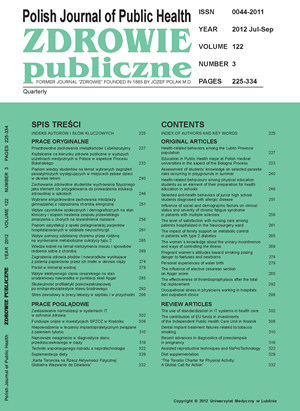Health-related behaviours among physical education students as an element of their preparation for health education in schools
DOI:
https://doi.org/10.12923/j.0044-2011/122/3/a.04Keywords:
physical education students, health education in school, Health Practice IndexAbstract
Introduction. The ordinance of the Minister of Education of 23 December 2008, which has been in force since 1 September 2009, implements a compulsory module of health education in middle and secondary schools. Its implementation has been entrusted to physical education teachers who are supposed to play the role of health leaders in school environments.
Aim. This study aims to demonstrate the effect of the process of education at the university of physical education on health behaviour among future health leaders.
Material and methods. The study was carried out among male and female students (n=197) at the first and fourth year of full-time studies in physical education. An anonymous auditorium testing was applied, with the questions concerning: gender, study year and five health-related behaviours. The number of health-related behaviours was used for determining Health Practice Index (HPI).
Results. Regardless of the gender or study year, the survey demonstrated that the most frequent unhealthy behaviours were: improper diet, inadequate participation in leisure time physical activity and, slightly less frequent, sleep deprivation. The significantly more favourable HPI was found for: all students in the fourth year compared to all students in the first year, women in the fourth year compared to women in the first year, men in both study years compared to women.
Conclusions. Although more favourable Health Practice Indexes were found in the fourth year, the level of unhealthy behaviours among university graduates remains very high. Since the graduates in physical education majors are supposed to perform the functions of health leaders in school environments in the future, it seems necessary that promotion of their healthy lifestyles becomes an important, integral part of the didactic and educational process.
References
1. Wojtyniak B, Goryński P, Kuszewski K, et al. Health situation of the population of Poland in the aspect of expected results on the National Health Programme implementation. Zdr Publ. 2005;115(2):125-31.
2. Karski BJ, Kozierkiewicz A. Zdrowie dla wszystkich w XXI wieku. Warszawa-Kraków: Vesalius; 2001. p. 11-2.
3. World Health Organization Regional Office for Europe. The European Health Report 2002. WHO Regional Publications, Regional Series No. 97. Copenhagen: WHO Regional Office for Europe; 2002.
4. Ministerstwo Edukacji Narodowej. Rozporządzenie Ministra Edukacji Narodowej z dnia 23 grudnia 2008 roku w sprawie podstawy programowej wychowania przedszkolnego oraz kształcenia ogólnego w poszczególnych typach szkół. Dz. U. z dnia 15 stycznia 2009 r, Nr 4, poz. 17.
5. Mika S. Psychologia społeczna. Warszawa: PWN; 1982.
6. Woitas-Ślubowska D. Pracownik kultury fizycznej przykładem osobowości kreującej zdrowie własne i wychowanków: mit i rzeczywistość. In: B. Chmielowski (ed). Nauki o kulturze fizycznej wobec wyzwań współczesnej cywilizacji. Katowice: AWF; 1996. p. 119-31.
7. US Department of Health and Human Services. Healthy People 2010: understanding and improving health. 2nd ed. Washington, DC: US Government Printing Office; 2000.
8. Patric DL, Cheadle A, Thompson DC, et al. The validity of self-reported smoking: a review and meta-analysis. Am J Public Health. 1994;84:1086-93.
9. Theobald H, Bygren LO, Carstensen J, et al. Validity of two questions on alcohol use in a health survey questionnaire. Scand J Public Health. 1999;1:73-7.
10. Pill R, Peters TJ, Robling MR. Social class and preventive health behavior: a British example. J Epidemiol Community Health. 1995;49:28-32.
11. Drabik J, Drabik P, Resiak M. Zachowania zdrowotne studentów wychowania fizycznego w Gdańsku. Gdańsk: Akademia Wychowania Fizycznego; 2000.
12. Gacek M. Rozpowszechnienie zachowań antyzdrowotnych wśród młodzieży studiującej w Akademii Wychowania Fizycznego i Politechnice Krakowskiej. Zdr Publ. 2005;115(3):312-4.
13. Wrona-Wolny W. Uwarunkowania i funkcje spożywania alkoholu przez sportowców. Kraków: Akademia Wychowania Fizycznego. Studia i Monografie; 2007.
14. Główny Urząd Statystyczny. Stan zdrowia ludności Polski w 2004. Warszawa; 2007.
15. Sołtysiak T. Młoda kobieta pije, dlaczego? Problemy Alkoholizmu. 1997;8-9:10-4.


